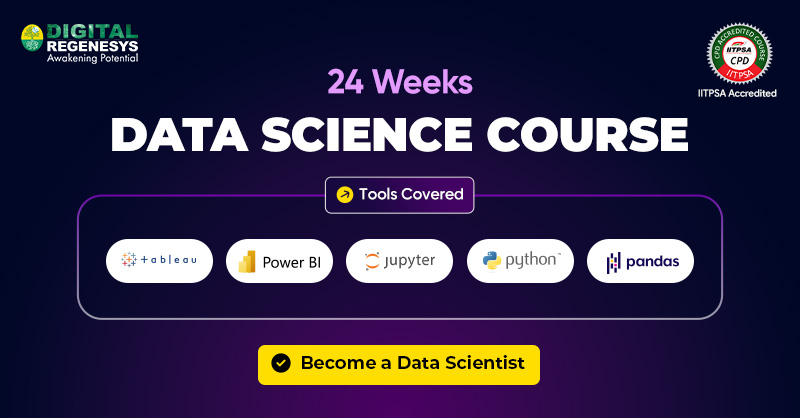The Ultimate Data Science Syllabus in South Africa for Students

A career in data science requires a strong understanding of programming, analytics, and statistical methods. For students planning their learning path, it is essential to understand what a typical data science syllabus in South Africa includes.
A well-structured syllabus introduces foundational topics such as statistics, probability, and programming, while gradually incorporating advanced concepts.
In this article, we will explore the full syllabus of data science in SA, covering core modules, elective modules, practical projects, and assessment methods. Students also gain exposure to Python topics in SA for programming, a machine learning curriculum for predictive modelling, an AI syllabus for intelligent systems, and data analytics tools in SA for visualisation and insights.
This guide offers a clear overview of the skills, tools, and modules learners can expect from a robust course, enabling them to plan their studies effectively.
Complete Breakdown of Data Science Syllabus in South Africa
The Digital Regenesys course content in SA typically includes core and elective modules, combining theoretical concepts with practical applications. Foundational subjects include statistics, probability, and programming, progressing to advanced topics such as the AI syllabus, cloud syllabus and machine learning curriculum in SA.
Students also gain experience with data analytics tools in SA and Python topics through hands-on projects. This approach ensures a balance between theoretical knowledge and practical application, enabling students to develop the skills necessary for professional settings.
Here are the main components of the full syllabus:
Introductory Data Science Modules
This module provides a foundation for the data science syllabus in South Africa, introducing learners to essential Python topics in SA and basic programming concepts. Students gain practical skills to manipulate and analyse datasets, preparing them for further modules.
The focus is on hands-on experience, building confidence in programming, and developing analytical thinking that is crucial for tackling real-world data problems.
- Python Programming Foundations
- Applied Python for Data Applications
Intermediate Data Science Modules
The intermediate module develops analytical skills and the ability to extract insights from data. It covers data exploration and visualisation techniques using tools aligned with the AI syllabus in SA.
Learners work on business intelligence projects, learning how to effectively interpret data and communicate findings clearly, which is an essential part of the data science syllabus.
- Data Exploration & Insight
- Business Intelligence & Data Visualisation with Power BI
Advanced Data Science Modules
This module focuses on advanced topics, including the machine learning curriculum in SA and project deployment. Students learn to build predictive models and apply machine learning techniques to real datasets.
The module integrates skills from Python topics in SA and prepares learners for implementing end-to-end data science projects with practical applications and industry relevance.
- Machine Learning for Predictive Analytics
- Data Science Project Deployment
Self-Paced Modules
The self-paced modules in the data science syllabus in South Africa allow learners to study at their own pace while gaining practical skills. Students cover essential tools, including Python topics, spreadsheet management, and database handling with MySQL.
The modules also introduce a cloud syllabus in SA concepts, an AI syllabus, and practical applications of the machine learning curriculum in SA. This flexible approach ensures learners can strengthen their technical skills and apply them to real-world projects independently.
Spreadsheet Essentials with Excel
Learners develop essential skills to manage and analyse data using Excel. This module covers formulas, functions, tables, charts, and pivot tables. These skills complement the data science syllabus and prepare students to use other analytics tools and modules within the broader course.
- Introduction to Excel
- Data Entry and Formatting
- Formulas and Functions
- Data Management and Cleaning
- Tables and Named Ranges
- Charts and Visualisation
- Pivot Tables
Data Management Using MySQL
This module teaches database management and SQL queries for structured data. Learners explore DDL, DML commands, joins, and aggregate functions. Connecting MySQL with Python topics in SA allows students to integrate programming and database management effectively, aligning with the practical aspects of the data science syllabus.
- DDL commands
- DML commands
- Keys
- Clauses
- Condition
- Aggregate functions
- Date & String functions
- Joins
- Python – MySQL database connectivity
Tableau
The Tableau module introduces data visualisation, dashboards, and business intelligence reporting. Students learn to connect to datasets, manage data, and create visualisations. Skills gained here complement the AI syllabus in SA, as well as the practical application of Python topics and the cloud syllabus in analytics projects.
- Installation and Interface Overview
- Connecting to Data Sources
- Data Handling in Tableau
- Visualisations with Charts
- Filters
- Sorting
- Calculated Fields
- Formatting and Aesthetics
- Dashboards
- Publishing and Sharing
MongoDB
This module focuses on NoSQL databases, covering architecture, data models, CRUD operations, and logical operations. Learners gain hands-on experience in managing unstructured data, which complements the knowledge gained from the machine learning curriculum in SA and other modules in the data science syllabus in South Africa.
- Introduction to NoSQL and MongoDB
- MongoDB Installation and Setup
- MongoDB Architecture and Data Model
- Data Types
- CRUD Operations
- Logical Operations

Practical vs Theory
A strong data science syllabus in South Africa strikes a balance between theoretical concepts and practical exercises. Theory introduces students to algorithms, statistical methods, and Python programming. Practical sessions enable learners to apply concepts using Python, machine learning curriculum, and data analytics tools in SA.
This dual approach develops problem-solving skills and prepares students for professional challenges, ensuring they are competent in both understanding and applying data science concepts.
Here is how theory and practical learning are structured:
- Theory Lessons: Focus on algorithms, statistics, and Python topics in SA – build a solid foundation.
- Practical Exercises: Include projects in Python, data visualisation, and machine learning – reinforce applied skills.
- Assessments: Graded tasks evaluate both theoretical and practical knowledge, providing a comprehensive evaluation.
Tools Taught
To effectively apply the concepts in the data science syllabus in South Africa, students learn to work with industry-standard tools and software. These tools cover programming, data manipulation, visualisation, and machine learning.
Hands-on experience with these platforms ensures that learners can implement Python topics, the machine learning curriculum, and the AI syllabusin real-world scenarios, preparing them for practical projects and professional applications.
- Python Programming: Core language for data analysis, scripting, and building models.
- Jupyter Notebook: Interactive environment for coding, testing, and documenting Python projects.
- Anaconda: A Distribution that simplifies package management and deployment of Python tools.
- Pandas: Library for data manipulation, cleaning, and transformation.
- NumPy: Provides numerical operations and array handling for efficient computations.
- scikit-learn: Framework for implementing machine learning models and algorithms.
- Seaborn: A Visualisation library for creating statistical graphics and plots.
- Streamlit: A Tool for building interactive web apps to showcase data projects.
- Power BI: Business intelligence platform for creating dashboards and data reports.
Industry Connections
Courses often integrate industry-relevant projects to enhance learning. A data science syllabus in South Africa includes collaboration with industry experts, real datasets, and guest lectures to provide practical insights.
Group exercises encourage teamwork, critical thinking, and problem-solving skills, helping students prepare for professional scenarios. Exposure to industry practices also familiarises students with trends in Python topics, the AI syllabus, and the machine learning curriculum, giving them a competitive edge.
Here are common industry integration methods:
- Projects with Real Datasets: Students work on real-world datasets to simulate industry challenges, which helps them apply the concepts learned during the course in a practical, hands-on manner.
- Guest Lectures and Webinars: Industry experts share insights on data analytics tools in SA and the AI syllabus, keeping learners updated on current trends and best practices in data science.
- Collaborative Exercises: Learners participate in group assignments and case studies, which develop their problem-solving, teamwork, and communication skills essential for professional environments.
Certifications Included in a Data Science Syllabus in South Africa
Certification validates skills acquired during a course. A data science syllabus often offers completion certificates and skill-based certifications. These certifications enable students to demonstrate their expertise and enhance their employability in analytics roles.
Course Completion Certificates
Students receive a certificate upon successfully finishing both core and elective modules, which confirms their mastery of the data science syllabus.
Assessment Methods
Assessment ensures that students have grasped both theory and practical concepts. A data science syllabus in South Africa includes written exams, projects, quizzes, and presentations. Continuous assessment through weekly tasks reinforces learning.
Projects utilising Python, machine learning, and data analytics tools enable students to demonstrate practical expertise. Presenting outcomes also improves communication and analytical thinking skills.
Here are common assessment methods:
1. Written Exams
Students complete written exams to assess their theoretical knowledge in statistics, Python and algorithms, ensuring they understand the core principles of the data science syllabus.
2. Practical Projects
Learners work on hands-on exercises using real datasets, which allows instructors to evaluate their applied skills and ability to implement concepts in practical scenarios.
3. Presentations
Students present their analysis results, which helps them communicate findings clearly while enhancing their critical thinking and professional communication skills.
4. Continuous Assessment
Weekly tasks and quizzes reinforce ongoing learning, helping students track progress and retain key concepts throughout the course.
Interview Readiness for a Data Science Syllabus in South Africa
Preparing for interviews requires both technical expertise and practical experience. The data science syllabus equips students with skills in Python, machine learning, and AI, which can be highlighted during technical discussions.
By building a strong portfolio from course projects, completing exercises, and revising core concepts, learners gain confidence to answer scenario-based and problem-solving questions commonly asked in data science interviews.
1. Portfolio Development
Compiling completed projects, datasets, and visualisations demonstrates practical experience and application of Python, machine learning, and analytics tools.
2. Technical Assessments
Working through coding challenges, model-building exercises, and case studies from the syllabus helps learners prepare for problem-solving tasks in interviews.
3. Review Core Modules
Revisiting foundational modules in the data science syllabus in South Africa ensures students can confidently explain key concepts in statistics, algorithms, and data analysis.
Conclusion
A well-structured data science syllabus in South Africa guides students from foundational knowledge to advanced concepts in analytics and machine learning. Including core and elective modules in SA, practical projects, and tools like Python and data analytics tools in SA ensures learners develop both theory and applied skills.
Assessment methods and interview preparation provide additional support for professional readiness.
Digital Regenesys offers a data science certificate course that covers Python, machine learning, AI and practical projects. Students earn a certificate upon completion and gain hands-on experience relevant to industry demands.
Visit Digital Regenesys to explore the data science course, gain practical skills, and begin your learning journey today.
Last Updated: 20 September 2025
